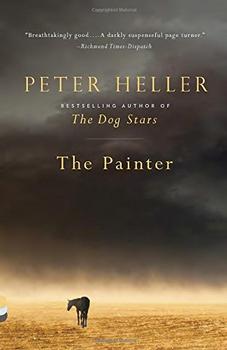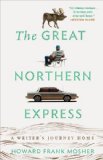Summary | Excerpt | Reviews | Beyond the book | Read-Alikes | Genres & Themes | Author Bio

Novellas
by Jim HarrisonBefore reading The Farmer's Daughter, my familiarity with Jim Harrison's work was limited to having seen the popular film version of his novella, Legends of the Fall. (And, I have to admit, as a heartthrob-infatuated teenager, I watched it an embarrassing number of times.) Whether or not the film accurately portrayed Harrison's written work, it planted in me a seed of stylistic expectation. I hoped for the sensual descriptions of the sweeping American Mid-West, and I wanted the landscape to actively contribute to the telling of the stories. In The Farmer's Daughter, Harrison not only lives up to those expectations, he exceeds them. Though all three of his novellas are distinct from one another, they are joined by the exploration of isolation, displacement, raw sexuality, human connection and, of course, by the inclusion of Patsy Cline's "The Last Word in Lonesome is Me."
In the great expanses of Montana, Harrison transports readers to a simpler but tougher place in "The Farmer's Daughter" and allows all of his characters to explore their limits, their curious sexualities, and their courage in spaces when no one else is looking, which at times adds an unsettling quality to his stories. One of my favorite elements of Harrison's writing is his ability to reveal the subtleties of a place - the landscape, cultural attitudes and atmosphere - through little details and show how they imperceptibly mix with the memories of an individual, further shaping their character. This plays out beautifully in the paradox of Sarah's penchant for fine literature and classical piano, alongside her ability to "[blow an antelope] out of his shoes" with a .30-06. Though admittedly, there are a few instances where Sarah's self-reflective thoughts feel too easily achieved and a bit unrealistic for her character, Harrison's exploration of isolation, loss and growth rings true to life.
In "Brown Dog Redux," Brown Dog, an Ojibwe Native American smuggles his stepdaughter Berry into Canada to avoid being sent to a state sanctioned school for children with disabilities. That sets them into motion, and throughout the story they move from place to place with such frequency that I found it difficult to remember where they were at any given time. That feeling of transience certainly added to my experience of the story.
One of the most enjoyable elements in "Brown Dog Redux" is Brown Dog himself. This character is rich throughout, all due to Harrison's vivid and unabashed language. Certainly, Brown Dog is a sexual hound, an alcoholic and a misfit at large. However, he is also a caring father that, despite his appetites, has the capacity to love deeply as is seen in his relationships with Berry, Gretchen (despite her inability to feel emotions) and the land where he grew up. The deep aches of homesickness he feels are gorgeously written and they brought me all too close to my own feelings of missing the places of my childhood.
In "The Games of Night" Harrison writes a riveting werewolf story without the mystery or darkness of traditional Gothic horrors. Akin to the magical realism of W.P. Kinsella, Harrison's character (presented in the first person) is afflicted with a blood disease brought on by an animal bite. The consequent fits he suffers throughout his life, while certainly dangerous to those around him, bring him closer to feeling alive and a part of nature. He philosophizes about the inability of humans to fully comprehend the experience of other animals and reaffirms the mystery inherent in each species, including ourselves. Each novella in The Farmer's Daughter is better than the last and "The Games of Night" re-opens the possibility of true love after it has taken a lifetime of isolation and longing to figure out.
![]() This review was originally published in The BookBrowse Review in February 2010, and has been updated for the
October 2010 edition.
Click here to go to this issue.
This review was originally published in The BookBrowse Review in February 2010, and has been updated for the
October 2010 edition.
Click here to go to this issue.

If you liked The Farmer's Daughter, try these:

by Peter Heller
Published 2015
Peter Heller, the celebrated author of the breakout best seller The Dog Stars, returns with an achingly beautiful, wildly suspenseful second novel about an artist trying to outrun his past.

by Howard F. Mosher
Published 2013
From bestselling, nationally celebrated author Howard Frank Mosher, a wildly funny and deeply personal account of his three-month, 20,000-mile sojourn to discover what he loved enough to live for.
Your guide toexceptional books
BookBrowse seeks out and recommends the best in contemporary fiction and nonfiction—books that not only engage and entertain but also deepen our understanding of ourselves and the world around us.